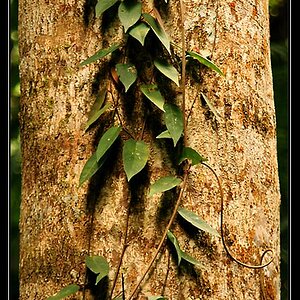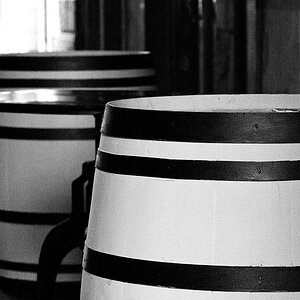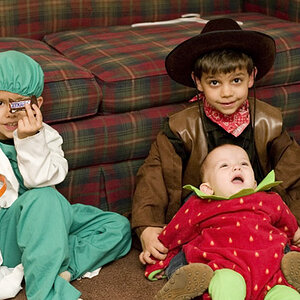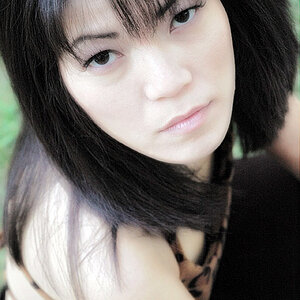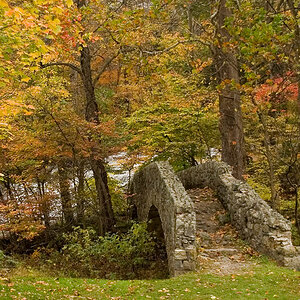epp_b
No longer a newbie, moving up!
- Joined
- Aug 22, 2008
- Messages
- 2,135
- Reaction score
- 12
- Location
- True North Cold and Freezing
- Website
- www.eppbphoto.com
- Can others edit my Photos
- Photos OK to edit
I just bought a 35mm film camera (Nikon n8008) and I am enjoying using it for a change from digital, but I'm wondering how practical and/or costly for me to actually use it more often. One of the reasons I've been wanting to use film (among others like dynamic range, workflow, having a big viewfinder, forcing myself to think more about the photos I take, etc) is because it gets mighty cold here in winter and I'm not sure I want to subject my D40 to our frigid weather too often. If somethings happens to a relatively cheap film camera...oh well, it's $50, not $500 (or more).
I have an artistic, but also technical background, so I prefer my photos to be in a digital format as they are much more malleable to me that way. To setup a dark room/light table/editing materials/development chemicals/etc is completely impractical and unrealistic for me. It doesn't really make sense for me, I can't afford it and I'm positive that I'd screw up my film every time. Besides, I already have a computer for otherwise personal and work use, so that doesn't even factor in as a cost for having my photos digitized.
Besides, I already have a computer for otherwise personal and work use, so that doesn't even factor in as a cost for having my photos digitized.
So, my process for film needs to be:
1. Buy film, use it
2. Develop it
3. Scan the negatives
I live in a small town in southern Manitoba, so my options are pretty limited for local solutions. There's only one place in town that sells and develops film (that I'm aware of) and they only have two consumer grade films, ASA 200 for $10 CAD and ASA 400 for $12 CAD, both Fujifilm brand. Both rolls are 24 exposures and include the cost of mailing two ways, development and 4x6 prints. I'll have to ask them if they would develop any film I give them and at what cost.
Amazingly, I found someone in my dinky little town who has a negative film scanner for their photo editing business. I have contacted them, but they haven't yet worked out a price for scanning negative film rolls. I imagine it's not going to be cheap.
So, let's work this out. With film, I do mostly outdoor shots in daylight, sometimes night exposures (but those long exposures using bulb, so the film speed is largely irrelevant), so I'm looking at buying Velvia 50 and/or 100. Let's say I buy in bulk and it comes out to $5.00 per 36 exposure roll.
If the local store will develop it, say it's $10.00. Based on other services that scan negatives, let's say that it costs $15.00. I don't know yet what resolution they can offer me, but I imagine it's at least as high as my D40 (and probably better because this is film resolution, not subject to digital limitations like noise and problems at 100% crops).
Total Cost: $30.00 per roll / $0.83 per shot. That's awfully expensive.
Alternatively, I might be able to mail my film to Don's Photo for them to develop and scan them to a CD at 6MP for $20.94, plus the cost of mailing (probably about $5.00 for a round trip). This is assuming they'll even do mail order. Don't forget to add $5.00 to buy the film in the first place.
Total Cost: $31.00 per roll / $0.86 per shot. Hang on a second, we're going backwards here, assuming my prices for having it all done locally are correct.
As a second alternative, I could send it to NCPS (whom I read are really good at this), who will develop and scan it at 16MP for $17.45 US, plus shipping (say $3.00 US for the round trip, because USPS prices are way better than Crappy Canada Post). Don't forget to add $5.00 to buy the film in the first place.
Total approximate cost in CAD: $31.00 per roll / $0.86 per shot. Same cost as Don's, but higher resolution.
However, I could have NCPS scan it at 6MP instead...
Total cost: $18.96 per roll / $0.53 per shot for NCPS to do it at 6MP.
Getting better, but, for NCPS, I have to drive across the border to ship and receive it, and deal with crappy border guards with crappy attitudes (or pay outrageous international shipping costs and deal with customs over the phone...not fun).
Is there anything that I haven't considered? Am I being ridiculous? There must be other more local places that I'm just unaware of.
It seems like scanning is the most expensive part of the process, yet, for me, the easiest. Does it make sense for me to buy a film scanner or are the ones for one or two hundred dollars not worth it? If it's just a matter of scanning speed and workflow, it's not really an issue for me as I am at my computer all day for work anyway.
Sorry for making this post an epic, I tried to summarize as best I could, thanks to all who endure it
I have an artistic, but also technical background, so I prefer my photos to be in a digital format as they are much more malleable to me that way. To setup a dark room/light table/editing materials/development chemicals/etc is completely impractical and unrealistic for me. It doesn't really make sense for me, I can't afford it and I'm positive that I'd screw up my film every time.
So, my process for film needs to be:
1. Buy film, use it
2. Develop it
3. Scan the negatives
I live in a small town in southern Manitoba, so my options are pretty limited for local solutions. There's only one place in town that sells and develops film (that I'm aware of) and they only have two consumer grade films, ASA 200 for $10 CAD and ASA 400 for $12 CAD, both Fujifilm brand. Both rolls are 24 exposures and include the cost of mailing two ways, development and 4x6 prints. I'll have to ask them if they would develop any film I give them and at what cost.
Amazingly, I found someone in my dinky little town who has a negative film scanner for their photo editing business. I have contacted them, but they haven't yet worked out a price for scanning negative film rolls. I imagine it's not going to be cheap.
So, let's work this out. With film, I do mostly outdoor shots in daylight, sometimes night exposures (but those long exposures using bulb, so the film speed is largely irrelevant), so I'm looking at buying Velvia 50 and/or 100. Let's say I buy in bulk and it comes out to $5.00 per 36 exposure roll.
If the local store will develop it, say it's $10.00. Based on other services that scan negatives, let's say that it costs $15.00. I don't know yet what resolution they can offer me, but I imagine it's at least as high as my D40 (and probably better because this is film resolution, not subject to digital limitations like noise and problems at 100% crops).
Total Cost: $30.00 per roll / $0.83 per shot. That's awfully expensive.
Alternatively, I might be able to mail my film to Don's Photo for them to develop and scan them to a CD at 6MP for $20.94, plus the cost of mailing (probably about $5.00 for a round trip). This is assuming they'll even do mail order. Don't forget to add $5.00 to buy the film in the first place.
Total Cost: $31.00 per roll / $0.86 per shot. Hang on a second, we're going backwards here, assuming my prices for having it all done locally are correct.
As a second alternative, I could send it to NCPS (whom I read are really good at this), who will develop and scan it at 16MP for $17.45 US, plus shipping (say $3.00 US for the round trip, because USPS prices are way better than Crappy Canada Post). Don't forget to add $5.00 to buy the film in the first place.
Total approximate cost in CAD: $31.00 per roll / $0.86 per shot. Same cost as Don's, but higher resolution.
However, I could have NCPS scan it at 6MP instead...
Total cost: $18.96 per roll / $0.53 per shot for NCPS to do it at 6MP.
Getting better, but, for NCPS, I have to drive across the border to ship and receive it, and deal with crappy border guards with crappy attitudes (or pay outrageous international shipping costs and deal with customs over the phone...not fun).
Is there anything that I haven't considered? Am I being ridiculous? There must be other more local places that I'm just unaware of.
It seems like scanning is the most expensive part of the process, yet, for me, the easiest. Does it make sense for me to buy a film scanner or are the ones for one or two hundred dollars not worth it? If it's just a matter of scanning speed and workflow, it's not really an issue for me as I am at my computer all day for work anyway.
Sorry for making this post an epic, I tried to summarize as best I could, thanks to all who endure it
Last edited:



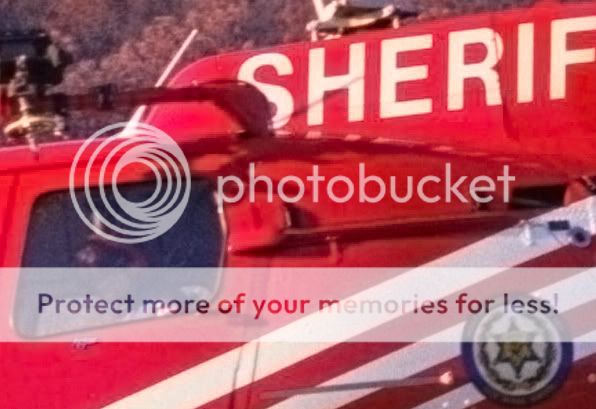
![[No title]](/data/xfmg/thumbnail/32/32157-d34c504b7ccf1335e959a8a2be6cfacc.jpg?1619735234)
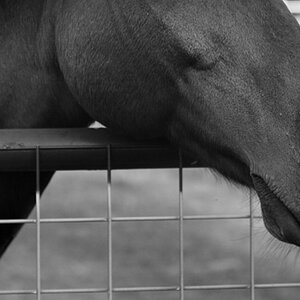
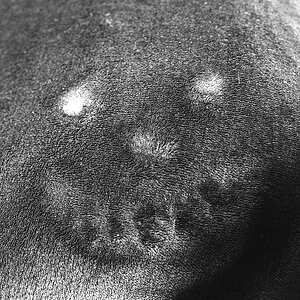
![[No title]](/data/xfmg/thumbnail/37/37614-3833b9d2e46075829c91cf9c0f47af69.jpg?1619738150)
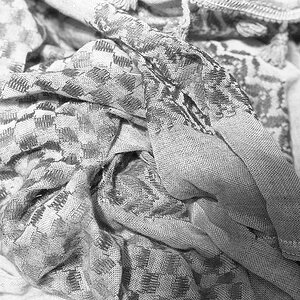
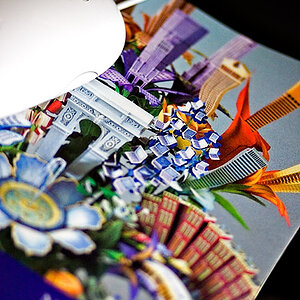
![[No title]](/data/xfmg/thumbnail/37/37613-6b200847731e552bb4bf9ba3bdb80183.jpg?1619738150)
